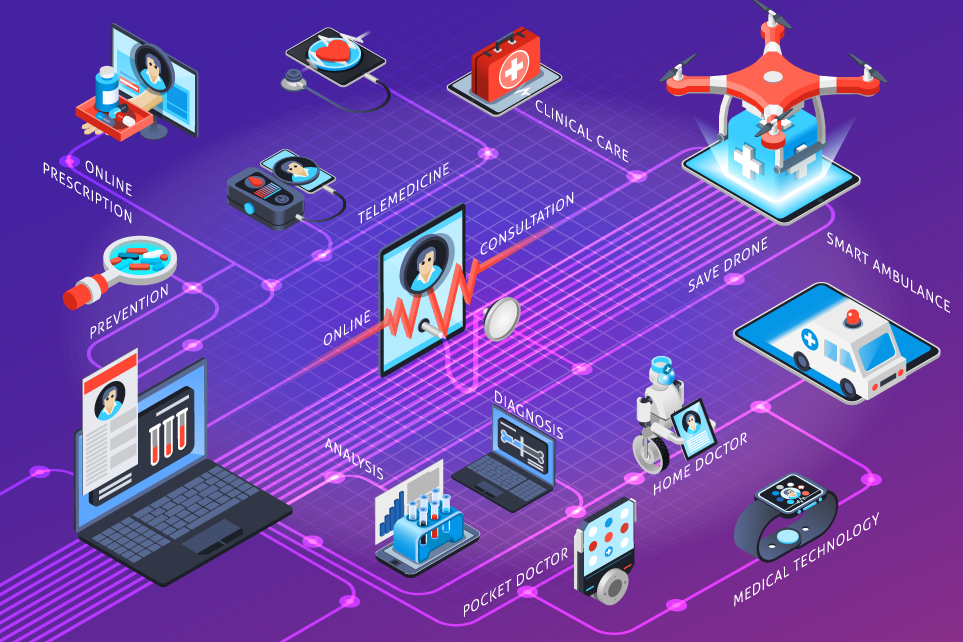As the worldwide population of 7.7 billion is likely to reach 8.5 billion by 2030, meeting healthcare challenges will be paramount for us. This is where machine learning can step in to provide the necessary technological support. It can help identify infection risks, improve the accuracy of diagnostics, and design personalized treatment plans to name a few.
LACE Index
It is a concept that identifies patients who are at risk of readmission or death within 30 days of being discharged from the hospital. The calculation is based on four factors – Length of stay of the patient in the hospital, Acuity of admission, Concurring diseases, and Emergency room visits. The LACE index is widely accepted as a quality of care barometer and is famously based on the theory of machine learning. Using the past health records of the patients, the concept helps to predict their future state of health. It enables medical professionals to allocate resources on time to reduce the mortality rate.
This technological advancement has started to lay the foundation for closer collaboration among industry stakeholders, affordable and less invasive surgery options, holistic therapies, and new care delivery models. Let’s take a look at some current and emerging ML innovations:
Drug Discovery
From the initial screening of drug compounds to calculating the success rates of a specific medicine based on physiological factors of the patients – the Knight Cancer Institute in Oregon and Microsoft’s Project Hanover are currently applying this technology to personalize drug combinations to cure blood cancer.
Machine learning has also given birth to new methodologies such as precision medicine and next-generation sequencing that can ensure a drug has the right effect on the patients. For example, today, medical professionals can develop algorithms to understand disease processes and innovative design treatments for ailments like Type 2 diabetes.
Optimized Patient Recruitment for Clinical Trials
Signing up volunteers for clinical trials is not easy. Many filters have to be applied to see who is fit for the study. With machine learning, collecting patient data such as past medical records, psychological behaviour, family health history, and more is easy.
In addition, the technology is also used to monitor biological metrics of the volunteers and the possible harm of the clinical trials in the long-run. With such compelling data in hand, medical professionals can reduce the trial period, thereby reducing overall costs and increasing experiment effectiveness.
Personalized Treatments
Every human body functions differently. Reactions to a food item, medicine, or season differ. That is why we have allergies. When such is the case, why is customizing the treatment options based on the patient’s medical data still such an odd thought?
Machine learning helps medical professionals determine the risk for each patient, depending on their symptoms, past medical records, and family history using micro-bio sensors. These minute gadgets monitor patient health and flag abnormalities without bias, thus enabling more sophisticated capabilities of measuring health.
Early Skin Cancer Detection
Machine learning is mainly used to mine and analyse patient data to find out patterns and carry out the diagnosis of so many medical conditions, one of them being skin cancer.
According to various reports, over 5 million people in the US are diagnosed with this disease annually. Unfortunately, the diagnosis is a virtual and time-taking process. It relies on long clinical screenings, comprising a biopsy, dermoscopy, and histopathological examination.
But machine learning changes all that. Moleanalyzer, an Australia-based AI software application, calculates and compares the size, diameter, and structure of the moles. It enables the user to take pictures at predefined intervals to help differentiate between benign and malignant lesions on the skin. The analysis lets oncologists confirm their skin cancer diagnosis using evaluation techniques combined with ML, and they can start the treatment faster than usual. Where experts could identify malignant skin tumours, only 86.6% correctly, Moleanalyzer successfully detected 95%.
Clinic Performance
Healthcare providers have to ideally submit reports to the government with necessary patient records that are treated at their hospitals.
Compliance policies are continually evolving, which is why it is even more critical to ensure the hospital sites to check if they are being compliant and functioning within the legal boundaries. With machine learning, it is easy to collect data from different sources, using different methods and formatting them correctly.
Machine learning helps in gathering, comparing and maintaining that data as per the standards laid down by the government.
Conclusion
The healthcare industry is steadily transforming through innovative technologies like AI and ML. The latter will soon get integrated into practice as a diagnostic aid, particularly in primary care. It plays a crucial role in shaping a predictive, personalized, and preventive future, making treating people a breeze.
We at AppleTech have the experience and expertise in building portals, mobile and web applications using machine learning as well as solutions for the healthcare sector. Come to us with your idea and watch it develop into a solution.

